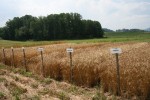North Carolina-grown, organic wheat: From field to bread
On Thursday, June 11, a group of mostly interested growers (with a few bakers thrown in the mix) gathered at the Mountain Research Station in Waynesville, N.C., to view the wheat trials of UDSA wheat breeder, Dr. David Marshall. Presented as part of the “New Marketing Opportunities for N.C. Farmers” grant proposal funded by Golden LEAF Foundation, administered by the state’s Agriculture and Consumer Services department, and held in conjunction with N.C. State University and the USDA, the “Field to Bread” event enabled the pubic to view the trials and hear from Dr. Marshall, Dr Chris Reberg-Horton (organic crop specialist and NCSU assistant professor), and me, Jennifer Lapidus (project coordinator of the N.C. Organic Bread Flour Project).
Dr Marshall began by pointing out why we are able to gather in this field and view wheat: Public breeding still takes place with small grains — wheat, barley, and oats — as opposed to corn and soybeans, which are controlled by private corporations. Both federal and state tax dollars are used to support small-grain breeding, and variety development is done through public institutions.
Most the wheat harvest underway in North Carolina is soft wheat, with some hard wheat (and the hope to see more and more hard wheat grown throughout the state). Soft wheat — which has lower protein and is used for pastries, cookies and biscuits (but usually not for bread) — is the wheat traditionally grown east of the Mississippi. In 2007, about 560,000 acres of wheat (most all of it soft) were planted in N.C., and more than 24 million bushels were harvested, used mostly for feed, with a small amount going to food-grade mills.
Hard wheat (aka bread wheat) has not traditionally been a successful grain in the Southeast due to our humidity, which causes disease in the field that affects both yield and performance quality in the bakery. But, beginning in 2002, the USDA-Agricultural Research Service began a program to identify and breed hard, “bread” wheat for production in the humid environments of the eastern United States. …
In Waynesville, Marshall’s rows of wheat contain both old and modern varieties, soft and hard. Old varieties such as Federation and Red Fife grow next to newer varieties such as Dual, Hondo, ARS03-3806 and ARS505-1234. Traits that he is observing in the field include disease resistance, maturity time, lodging (this is when the wheat falls over, making it impossible to harvest mechanically) and yield. Bakers want flavor and performance, something that cannot be detected in the field (except too much rain right before harvest can cause sprouting in the field, which in turn can affect performance by causing an increase in alpha amylase, an enzyme that breaks down starch. But the weather is something we cannot control).
Dr. Chris Reberg-Horton discussed the challenges we face getting the grain from field to bread. Beyond the growing of the wheat, there is the cleaning and storing of the grain. Growers who have already been growing soft wheat in N.C. and would like to grow hard wheat for a better price point may have harvester thresher-combine equipment, but not proper grain storage.
… What does it take to get that grain from the field into the bakery? Wheat is harvested in June and must be stored in the hottest most humid time of the year. Grain stores better if it is clean. And if we want to create a truly N.C flour, we need to be able to store N.C. wheat separate from imported wheat—mills traditionally store grain by grade, not locality.
My job is sort of all over the map, talking with everybody, trying to connect the dots. If only wheat from field to bread was as easy as apples to apple sauce …
This talk in the Waynesville wheat rows, surrounded by mountains, generated questions about possible wheat growing in Western North Carolina. Most all of the wheat in the state is grown everywhere except the western region, because acreage here is typically much smaller and owning the harvest threshing combine equipment for less than 30 acres may not be cost effective. But what about the remnants of old grain mills scattered throughout these mountains? People were growing wheat here, on smaller plots, and the smaller equipment to harvest and combine, Reberg-Horton explained, are those strange pieces of equipment gathering dust, covered in cobwebs, tucked back in the back corner of many barns. …
To read Lapidus’ entire blog, click here.
photo by D. Kaleb Rathbone



Before you comment
The comments section is here to provide a platform for civil dialogue on the issues we face together as a local community. Xpress is committed to offering this platform for all voices, but when the tone of the discussion gets nasty or strays off topic, we believe many people choose not to participate. Xpress editors are determined to moderate comments to ensure a constructive interchange is maintained. All comments judged not to be in keeping with the spirit of civil discourse will be removed and repeat violators will be banned. See here for our terms of service. Thank you for being part of this effort to promote respectful discussion.